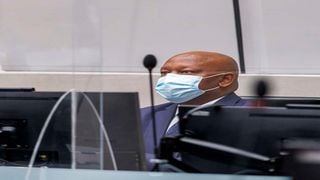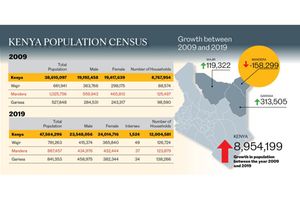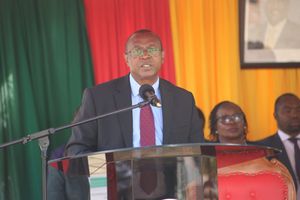
Lawyer Paul Gicheru during the opening of his case at the ICC on February 15, 2022. His defence has sought to portray the prosecution’s main witness as unreliable.
News
Premium
Paul Gicheru team works to discredit witness
What you need to know:
- Kenyan lawyer’s team largely ignores evidence presented and tries to paint the witness as unreliable.
- Prosecution has recordings and photographs of people sent to convince him to drop out of DP Ruto’s case.
The Hague
The evidence of the first prosecution witness in the case against lawyer Paul Gicheru seems to have rattled the defence, which has spent two days trying to counter his testimony by questioning his integrity.
Mr Gicheru’s lead counsel, Michael Karnavas, began cross-examining witness P-0800 on Wednesday and continued for the whole of yesterday as he seeks to portray the witness as unreliable.
According to Mr Karnavas, witness P-0800 is “not to be believed. And that is what I am going to argue.”
Yesterday, presiding Judge Miatta Maria Samba asked the defence to wrap up its cross-examination and even shortened the lunch break by 30 minutes to give Mr Karnavas more time with the witness.
The judge asked Mr Karnavas to cut down on “unnecessary” questions and asked the witness to “avoid long arguments with the counsel.”
Though P-0800 is the first prosecution witness, the evidence he provided is at the core of the case against Mr Gicheru — he recorded phone conversations he had with people who had allegedly been sent to him to convince him to withdraw as a witness against Deputy President William Ruto.
Witness’ credibility
The recorded phone conversations, according to the prosecution’s trial brief, not only have discussions about the bribes P-0800 was to receive but also Mr Gicheru’s alleged role in the witness tampering scheme.
Working with investigators from the Office of the Prosecutor (OTP), the witness also set up a meeting with one of the Common Plan members, which was also recorded and photographed. This, too, is part of the evidence against Mr Gicheru.
“During these controlled meetings... offered P-0800 a bribe of Sh1 million and informed him that the funds to pay P-0800 and other witnesses were coming from Ruto,” the prosecution stated in the trial brief.
The prosecution spent about half a day leading the witness in his evidence-in-chief on Tuesday. The defence then started the cross-examination on Wednesday.
While the defence has largely avoided questioning the witness on the recordings he handed to the prosecution, Mr Karnavas continued with his line of questioning the witness’ credibility and reliability.
Yesterday, Mr Karnavas spent considerable time asking the witness why he had many phones and SIM cards as he sought to portray the witness as having been knee-deep in witness tampering.
Influencing witnesses
The defence has also zeroed in on admissions by the witness that he contacted other witness and has lied to the prosecution before by concocting stories, including of an imaginary meeting. The witness also admitted to making four phone calls to one of the Common Plan members but which he did not record.
Without a recording, whatever the witness says is his word against Mr Gicheru’s, says the defence.
Mr Karnavas also questioned the witness’s assertion that he had not been shown a draft affidavit to withdraw from the Ruto case. According to the witness, he was given blank papers to sign but the defence contends that he was aware of the content of the documents he signed.
Mr Gicheru has been charged with eight counts of corruptly influencing witnesses who were set to testify against Mr Ruto. He has denied the charges.
Other than when the judge asked him to stand up and take a plea, Mr Gicheru has not had much to do inside the court room where he sits behind his four-member team of lawyers. In the public gallery, his wife follows the proceedings, sometimes taking notes.
The trial resumes on Monday when the next prosecution witness P-0341 begins his testimony.





